CRUSADER
Gold Member
http://forum.treasurenet.com/index.php/topic,400486.0.html
Returned to a large ploughed field which I now know had Linseed drilled into it in March & due to no rain it all failed. We did 5 hours today but the conditions (dried clay) make it dangerous extracting finds & difficult, added to this it's not a very productive field :P Still I had a good result with the now delivered 11" coil getting a hammered quarter on its maiden outing My old 11" found me far more cut qrters & farthings than my 9" stock coil. (that funny enough found me the sixpence yesterday) 8)
My old 11" found me far more cut qrters & farthings than my 9" stock coil. (that funny enough found me the sixpence yesterday) 8)
So we had 1 hammered shortcross & a scrappy roman on both visits to this tough field.
I found a most interesting item, not because I haven't got a few but because of whats happened to it. Its a 13-14th C Lead Seal Matrix which I believe to have been deliberately folded in half. This reminds me of the coin folding custom of the similar period. Is there any correlation between the two Not sure as I've forgotten the reason they did it, to bring good luck or cast a curse
Not sure as I've forgotten the reason they did it, to bring good luck or cast a curse  All I know is that a plough never did it
All I know is that a plough never did it  There maybe a number of other reasons unknown to me, any thoughts?
There maybe a number of other reasons unknown to me, any thoughts?
When its not folded it would have looked like:
http://www.ukdfd.co.uk/ukdfddata/showrecords.php?product=893&cat=all
Returned to a large ploughed field which I now know had Linseed drilled into it in March & due to no rain it all failed. We did 5 hours today but the conditions (dried clay) make it dangerous extracting finds & difficult, added to this it's not a very productive field :P Still I had a good result with the now delivered 11" coil getting a hammered quarter on its maiden outing
 My old 11" found me far more cut qrters & farthings than my 9" stock coil. (that funny enough found me the sixpence yesterday) 8)
My old 11" found me far more cut qrters & farthings than my 9" stock coil. (that funny enough found me the sixpence yesterday) 8)So we had 1 hammered shortcross & a scrappy roman on both visits to this tough field.
I found a most interesting item, not because I haven't got a few but because of whats happened to it. Its a 13-14th C Lead Seal Matrix which I believe to have been deliberately folded in half. This reminds me of the coin folding custom of the similar period. Is there any correlation between the two
 Not sure as I've forgotten the reason they did it, to bring good luck or cast a curse
Not sure as I've forgotten the reason they did it, to bring good luck or cast a curse  There maybe a number of other reasons unknown to me, any thoughts?
There maybe a number of other reasons unknown to me, any thoughts? When its not folded it would have looked like:
http://www.ukdfd.co.uk/ukdfddata/showrecords.php?product=893&cat=all
Attachments
Upvote
0


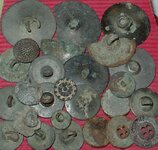
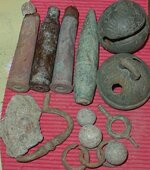
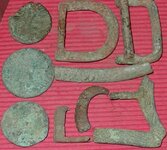
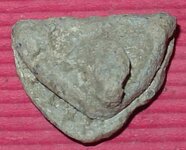
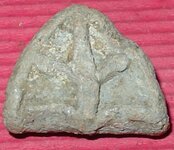
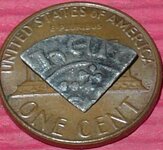
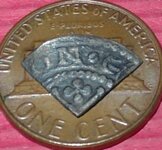




 I am so impressed with your neat finds. Thank you for sharing them.
I am so impressed with your neat finds. Thank you for sharing them.
